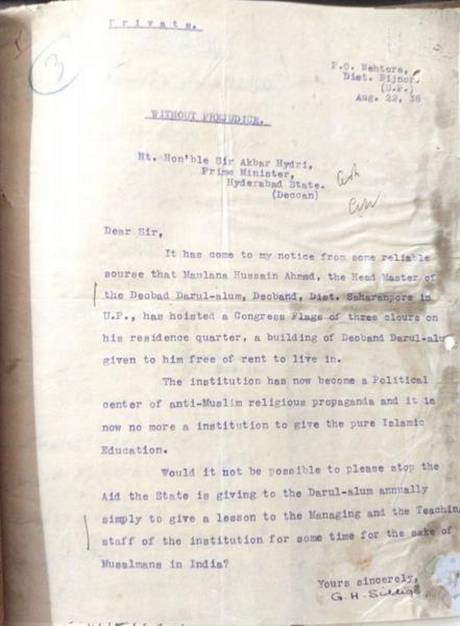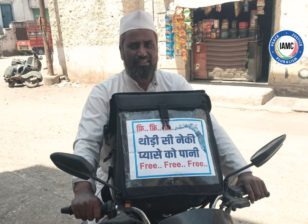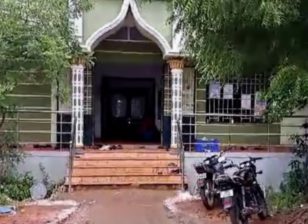A Muslim freedom fighter who was dead against partition
Those who supported partition sought the then Hyderabad PM’s intervention to stop funds to Darul Uloom in UP
It was the time when Hindus and Muslims joined hands to fight for India’s freedom, and Darul Uloom at Deoband in Uttar Pradesh and scholars of the Islamic seminary played a vital role.
So much so that those who opposed the strong anti-partition stand of celebrated freedom fighter Maulana Hussain Ahmed Madani, who taught hadith (tradition of Prophet Muhammad) at the institution, termed it ‘anti-Muslim’, and even sought a rescinding of a grant to the seminary from the State of Hyderabad.
Documents preserved at the Telangana State Archives and Research Institute reveal that on August 22, 1938, one G.H. Siddiqui from Bijnore had complained to Prime Minister of Hyderabad, Sir Akbar Hydari, saying that Maulana Madani had unfurled a Tricolour atop his allotted quarters. He then proceeded to describe the seminary as an ‘institution which has now become a political centre of anti-Muslim religious propaganda and is now, no more an institution to give pure Islamic education’. He then sought to know whether it would be possible to briefly stop the annual grant to teach a ‘lesson’ to the staff.
Sir Hydari’s handwritten note, polite in tone and tenor, found its way to the Vice Chancellor of the seminary, Maulana Shabbir Ahmed Usmani, another celebrated Islamic scholar, to know whether this was true, even as he requested him to investigate the matter.
In his response, Maulana Usmani said that not only was the incident true, but the small flag that was once atop the quarters was replaced by a much larger one. The maulana, whose political leanings were diametrically opposed to those of Maulana Madani, supported the creation of Pakistan and eventually moved there. He had pointed out that the incident had happened in his absence. While Maulana Madani’s office had responded to inquiries, he himself had not.
The letter shows that there was not much that Maulana Usmani could do. In the letter he writes, “Esteemed sir, you may remember that as I have previously informed you that 10 or 11 years ago, when my predecessors appointed the maulana as principal of the institution, they had accepted all his conditions, that his political activities and leanings would not be restricted.”
Academic and author Shamsul Islam, in his book “Muslims Against the Partition of India”, writes that Maulana Madani, who was fiercely against partition, was famous for saying in 1937, nearly a year before the incident as mentioned in the letter to Sir Hydari, that ‘nations are based on homelands, not religion’.
Speaking to The Hindu, noted cleric and president of Jamiat-e-Ulama Hind (Arshad Madani group) Maulana Arshad Madani, who is the freedom fighter’s son, opined that the staunch opposition to partition was a result of foresight, and conviction in peaceful coexistence of communities.
“He was of the strong opinion that partition would not auger well for Muslims in India and Hindus in Pakistan. He believed that for 1,300 years, both communities lived next to each other without problems. We saw what happened after partition. He was imprisoned for a total of nine years, including in Sabarmati jail, and in Matla,” he said.
This article first appeared on The Hindu




